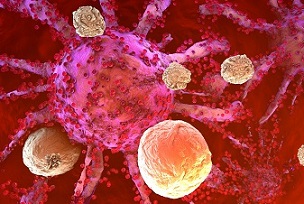BREAKING NEWS! American Study Identifies 14 Understudied T-Reg Proteins That Control T-Reg Cell Identity
TMN News Team Aug 03, 2023 1 year, 8 months, 3 weeks, 1 day, 11 hours, 33 minutes ago
Thailand Medical: In a new discovery, researchers from Purdue University and the U.S. National Institutes of Health (NIH) have shed light on 14 understudied T-regulatory (T-reg) proteins that play crucial roles in disease onset and immune system regulation. The study, led by Dr Majid Kazemian, an associate professor of biochemistry at Purdue, and NIH's Dr Jorge Trujillo-Ochoa and Dr Behdad (Ben) Afzali, focuses on the molecular mechanisms underlying autoimmunity, infection, and cancer.

Dr Kazemian told
Thailand Medical News, “The immune system is a complex network of cells that work together to defend the body against harmful pathogens. However, sometimes this system can become unbalanced, leading to either an overactive immune response causing autoimmune diseases like type 1 diabetes, multiple sclerosis, and rheumatoid arthritis, or an underactive response that increases susceptibility to cancer. T-reg cells are the crucial mediators that maintain this delicate balance.”
Despite their small percentage in the overall T-cell population, T-reg cells are indispensable for our well-being. The research delves into the intricate molecular processes governing these regulatory cells. Understanding these processes is essential as they hold the potential to uncover vital connections between molecular dysfunctions and the onset of various diseases.
Transcription factors, proteins that regulate sets of genes, have been at the center of attention in this study. They program regulatory cells, like T-regs, to perform specific functions. The study team has identified specific transcription factors responsible for maintaining the core function of dampening the activity of other immune cells.
However, there are still numerous understudied transcription factors that may play significant roles in shaping T-reg cell identity and function.
The researchers believe that identifying these transcription factors could lead to groundbreaking insights into the development of autoimmune diseases and cancer. By pinpointing the aberrant cellular programs that arise due to transcription factor dysfunction, scientists may discover new ways to intervene and prevent the onset of these conditions.
One remarkable finding from the research is the association of a specific gene in T-regs, called TCF1, with the severity of colorectal cancer. This discovery could pave the way for more targeted therapies that harness the power of T-regs to treat cancer effectively.
Dr Behdad Afzali, an NIH researcher, and M.D.-Ph.D. holder, is particularly intrigued by cell therapy involving T-reg cells. The idea of removing regulatory cells from the body, modifying them externally, and then reintroducing them back in as a form of therapy is an exciting area of research. Cell-based therapy, including regulatory T cells, has shown immense promise in treating various diseases and holds great potential for future medical interventions.
The study published in Nature Reviews Immunology outlines the roles of various transcription factors, including members of the basic helix-loop-helix, basic leucine zipper, CUT homeobox, zinc-finger domain, and interferon regulatory factor families, along with lin
eage-defining transcription factors.
https://www.nature.com/articles/s41577-023-00893-7
Understanding how these factors contribute to T-reg cell identity and function will unlock the basic mechanisms underlying autoimmunity, potentially leading to the development of innovative and targeted drug therapies.
This groundbreaking research represents a significant step forward in our understanding of T-regulatory cells and their impact on human health. With the identification of these 14 understudied T-reg proteins, the scientific community can now direct its focus on developing novel treatments and interventions that harness the power of T-regs to combat autoimmune diseases, infections, and cancer effectively.
As the world grapples with increasing health challenges, this breakthrough could be a beacon of hope, offering new avenues for personalized medicine and revolutionizing the way we approach immune-related disorders. The collaboration between Purdue University and NIH highlights the importance of multidisciplinary research in uncovering the complexities of the human immune system and finding innovative solutions to improve global health.
For the latest developments in the field of Immunology, keep on logging to
Thailand Medical News.
